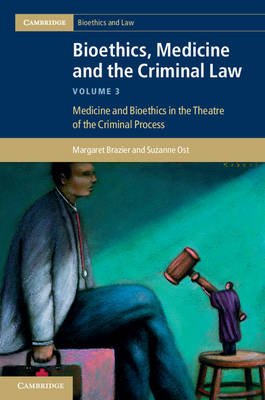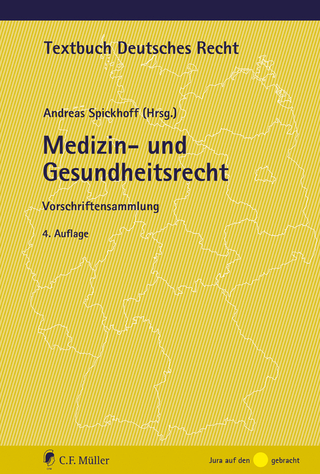
Bioethics, Medicine and the Criminal Law
Seiten
2013
Cambridge University Press (Verlag)
978-1-107-01825-9 (ISBN)
Cambridge University Press (Verlag)
978-1-107-01825-9 (ISBN)
The conscription of criminal law into moral controversy and the (perceived) rise in criminal investigations of medical errors set the backdrop for this analysis of the relationship between medicine, bioethics and criminal law. Includes case studies on abortion, end of life and the separation of conjoined twins.
To date, little analysis exists of the criminal process's roles as a regulator of medical practice and as an arbiter of bioethics, nor whether criminal law is an appropriate forum for judging ethical medical dilemmas. The conscription of criminal law into moral controversy and the (perceived) rise in criminal investigations of medical errors sets the backdrop for this innovative historical and theoretical analysis of the relationship between medicine, bioethics and the criminal process. Case studies on abortion, end of life and the separation of conjoined twins reveal how judges grapple with bioethics in criminal cases and the impact of 'theatre' on the criminal law's response to ethically controversial medical cases. A central argument is that bioethics and criminal law are not necessarily incompatible; rather, it is the theatre surrounding interactions between bioethics and criminal law that often distorts and creates tension.
To date, little analysis exists of the criminal process's roles as a regulator of medical practice and as an arbiter of bioethics, nor whether criminal law is an appropriate forum for judging ethical medical dilemmas. The conscription of criminal law into moral controversy and the (perceived) rise in criminal investigations of medical errors sets the backdrop for this innovative historical and theoretical analysis of the relationship between medicine, bioethics and the criminal process. Case studies on abortion, end of life and the separation of conjoined twins reveal how judges grapple with bioethics in criminal cases and the impact of 'theatre' on the criminal law's response to ethically controversial medical cases. A central argument is that bioethics and criminal law are not necessarily incompatible; rather, it is the theatre surrounding interactions between bioethics and criminal law that often distorts and creates tension.
Margaret Brazier is a Professor of Law at the University of Manchester. Suzanne Ost is a Professor of Law at Lancaster University.
Introduction: beginning the story; 1. Courtrooms, 'physic' and drama; 2. Crime, doctors and the body (politic); 3. From the 'theatre' to the dock via the mortuary; 4. Protecting life before birth; 5. Medical (and non-medical) ending of life; 6. Which twin lives?; 7. Drawing connections: morality, (political) liberalism, responsibility and the theatre of interpretation; 8. Parallels and disconnects: bioethical principles, principles of criminalisation and the rule of law; Concluding thoughts: a story part told?
| Erscheint lt. Verlag | 2.5.2013 |
|---|---|
| Reihe/Serie | Bioethics, Medicine and the Criminal Law 3 Volume Set ; Volume 3 |
| Verlagsort | Cambridge |
| Sprache | englisch |
| Maße | 155 x 235 mm |
| Gewicht | 590 g |
| Themenwelt | Recht / Steuern ► EU / Internationales Recht |
| Recht / Steuern ► Privatrecht / Bürgerliches Recht ► Medizinrecht | |
| Recht / Steuern ► Strafrecht | |
| ISBN-10 | 1-107-01825-0 / 1107018250 |
| ISBN-13 | 978-1-107-01825-9 / 9781107018259 |
| Zustand | Neuware |
| Informationen gemäß Produktsicherheitsverordnung (GPSR) | |
| Haben Sie eine Frage zum Produkt? |
Mehr entdecken
aus dem Bereich
aus dem Bereich
Vorschriftensammlung
Buch | Softcover (2024)
C.F. Müller (Verlag)
CHF 76,95


